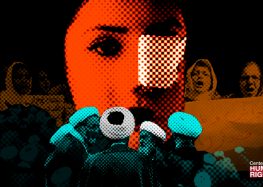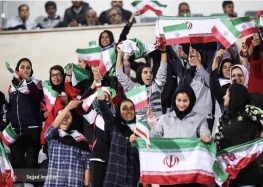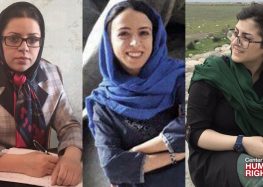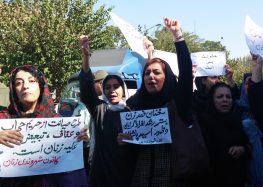Women Prevented from Attending Iran’s Premier League Finale
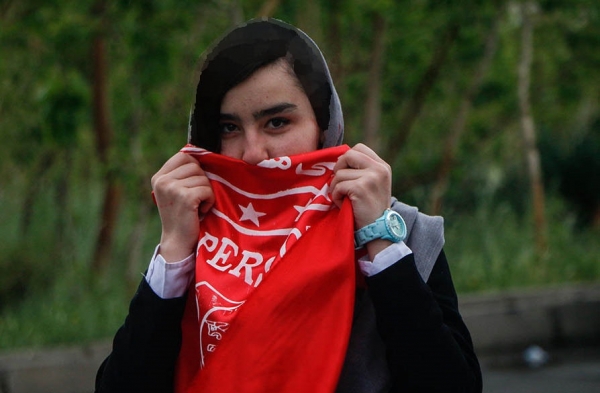
Ban on Women in Stadiums Upheld Under President Rouhani
Iranian women were once again blocked from attending a major public sports event alongside men as the police stopped women from entering Tehran’s Azadi Stadium for the finale of Iran’s Premier League soccer season on May 13, 2016.
A 15-year-old girl who tried to get into the stadium by dressing as a boy was arrested, according to Varzesh 3, a sports website belonging to the state-controlled Islamic Republic of Iran Broadcasting (IRIB) station.
The girl’s arrest was not covered by other official Iranian news outlets, but several women’s rights groups and female celebrities took to social media to initiate debate on Iran’s continuing ban on women in sports stadiums.
“I will repeat this as long as it’s necessary: The final week of the Premier League football [soccer] season reached its peak in the absence of women,” said the popular Iranian actress, Mahnaz Afshar, on Twitter.
The discussion expanded on Twitter with the hashtag #LetWomenGoToStadiums, as Iranian women shared and discussed other examples of discrimination.
Foreign Women Welcome, Iranian Women Excluded
Two days before a critical game between the popular Persepolis and Rah Ahan soccer teams in Tehran on May 11, 2016, the IRIB-affiliated Young Journalists Club reported that security officials had agreed to a request from Persepolis’s Croatian coach, Branko Ivanković, to allow his wife and daughter to watch the match from Azadi Stadium’s VIP section.
The double standard was a painful slap in the face for Iranian women who have been fighting for decades to regain the right to enter sports arenas to watch male athletes compete. Their struggle first received international exposure in 2005 with director Jafar Panahi’s critically acclaimed film, Offside.
The film was banned in Iran and deepened the authorities’ mistrust of Panahi, who is known as one of the country’s leading socially conscious filmmakers. Panahai has been repeatedly arrested and has been banned from making more films or leaving Iran.
The White Scarf Movement: Women Behind Closed Gates
The ban on women attending sports events alongside males dates back to Iran’s 1979 revolution, when official attitudes towards women’s’ roles in society changed dramatically under the country’s new theocratic rulers.
In the early 2000s, protests against the ban grew into an organized movement known as the White Scarf Campaign, with the slogan: “Women [Only] Have Half of Freedom.”
White Scarf campaigners gained notoriety among hardliners in 2005 as the women defiantly cheered behind the bars outside the entrance of Azadi Stadium where reformist President Mohammad Khatami was the guest of honor for a highly charged World Cup qualifying match between Iran and Bahrain—the event was attended by around 100,000 exclusively male fans.
Despite ongoing protests by Iranian activists and the Fédération Internationale de Football Association’s (FIFA) call for Iran to allow women to watch soccer games from sports arenas, the ban remains in place.
In 2006 conservative President Mahmoud Ahmadinejad authorized Iran’s Physical Education Organization to begin preparing to allow women to enter sports arenas, but the initiative was challenged by the clerical hierarchy in the city of Qom and was never carried out.
President Hassan Rouhani’s campaign promises of a more open society led to high hopes that his election in 2013 would lead to positive changes, but in some ways matters have become worse.
Before Rouhani’s election, the authorities mostly turned a blind eye to females attending men’s volleyball games. But as Iran’s national male volleyball team rapidly rose in world rankings in the past three years, women have been prevented from attending public matches.
In February 2016 Iran hosted the Beach Volleyball World Championship with the pledge that female fans would not be prevented from watching from the stands, but that four-day event also passed without the presence of any women in the arenas.


